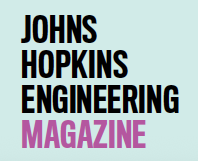For Taein Lee, Engr ’22 (PhD), inspiration struck when a pipe burst in his downtown Baltimore rowhouse one winter. “The whole ceiling, the insulation, everything just fell,” he says. As Lee cleaned up the damage, he realized all that soggy drywall would have to be thrown away and replaced. Was there a way to make more sustainable construction materials, he wondered? “Being an engineer, I try to take things into my own hands,” he says.

And so he did.
In 2022, Lee formed a company, JJ Innovative Materials, with two other Johns Hopkins alumni: Mark B. Wo, Engr ’16, who serves as chief operations officer, and Chu Ding, Engr ’20 (MSE), ’22 (PhD), director of compliance. Lee is CEO. Their goal is to make construction materials that are better for the planet.
According to the Environmental Protection Agency, the U.S. generates 600 million tons of construction and demolition waste each year. Most of it ends up in landfills. Traditional drywall is mostly made from gypsum, which, under certain conditions, can decompose into toxic chemicals over time.
Lee’s idea was to develop a plant-rock bonding technology that integrates plants and cementitious materials to make a more sustainable drywall product. “Recycled waste materials currently make up over 65% of our drywall,” he says. “We want to boost that to 95%. Our goal is to make our drywall carbon negative.” This means that the materials and process not only reduce carbon emissions, but actually remove more carbon dioxide from the atmosphere than is emitted.
To make their drywall cost-effective as well as sustainable, Lee’s company uses plant waste called “hemp hurds” from industrial hemp farms. “There are tons of bales of these rotting away on farms,” he explains. The plants are used not just as filler but also processed to be completely physically and chemically integrated into the materials matrix.
JJ Innovative Materials is currently scaling up its manufacturing capacity in a warehouse in Baltimore’s Hampden neighborhood to serve its first customers—residential construction firms.
“Recycled waste materials currently make up over 65% of our drywall. We want to boost that to 95%. Our goal is to make our drywall carbon negative.”
— Taein Lee
While Lee’s PhD focus was on organic electronic materials, he’s happy with the unexpected turn his career has taken. “I wanted to get my hands on more immediate problems that I could tackle with my specialty. I wanted to make tech that could really have an impact.”
— ABIGAIL GREEN
illustration by Joe Kimmel

